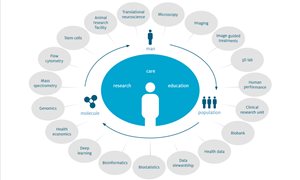

About
We focus on the pathogenesis of diseases and the development of improved diagnostics, therapies and follow-up.
Contact

prof. dr. Fred Sweep
department head
Contact our team by email:
contact form
Research groups organized by our department
Scientific impact

Ambition and impact
See how our department creates scientific impact that leads to innovation in health and healthcare.
read moreAmbition and impact
We focus on the pathogenesis of diseases and the development of improved diagnostics, therapies and follow-up.
Our priority is to bring questions from the patient bed to the laboratory bench, and to provide answers from the bench to the patient that contribute to better patient care.

Research programs
Our department is active in several research programs. Use the filter option on the research programs page to see which programs we contribute to.
see page
Technology centers to boost your research
See which of the 19 technology centers are affiliated with our department and how they can enhance your research.
read moreTechnology centers to boost your research
The Radboudumc Technology Centers are an access point for technological expertise, high-end equipment and biobanks. They can support a wealth of research questions. The centers are linked to research facilities of both Radboudumc and Radboud University.
See which of the 19 technology centers are affiliated with our department and how they can enhance your research.
-
This technology center collects, stores and manages biomaterial and the corresponding clinical data in a standardized way.
For more information and services, see their page.
-
This technology center has extensive experience with flow cytometry in basic and translational research, ranging from single cell phenotyping and sorting to extensive immuno-profiling in clinical trials.
For more information and services, see their page.
Other efforts
Internships
Students of our medical faculty can access OnStage with their RU account. An overview of all internship opportunities is available here.
Are you not a student of our medical faculty? Then you can use our department's general contact information, found at the top of the department page.
Organization and people
Getting here
Visiting address
Radboudumc main entrance
Geert Grooteplein Zuid 10
6525 GA Nijmegen
Directions



Vacancies
When research positions become available in our department, they will automatically appear in an overview below.
